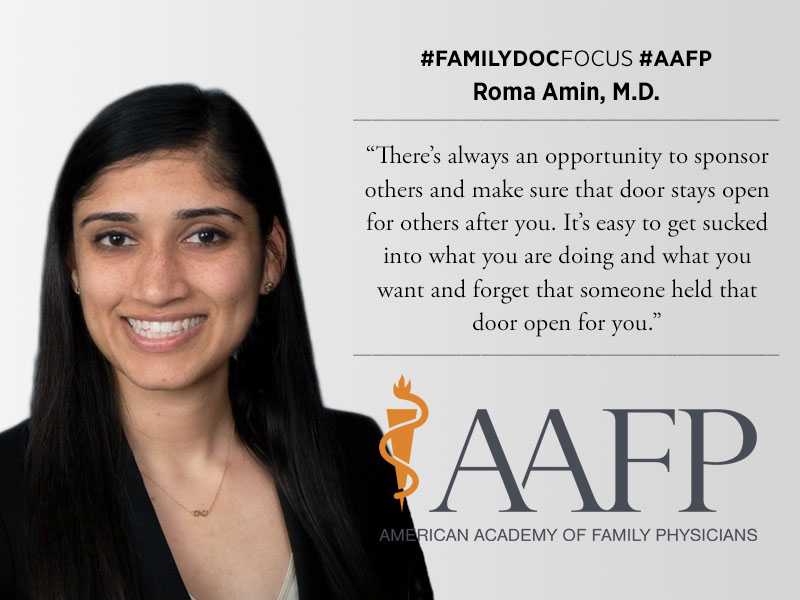State Leader Found Her Niche in Academic Medicine
April 5, 2021, 1:20 p.m. David Mitchell — Roma Amin, M.D., always knew she wanted to be a doctor or a teacher. As a faculty member of the Grant Family Medicine Residency in Columbus, Ohio, she’s doing both.

“Growing up I viewed doctors as people who could help individuals of all backgrounds, and that was really appealing to me,” said Amin, who also is the clerkship coordinator for medical students who rotate with the residency.
A child of Indian immigrants, Amin said her teachers were instrumental in helping her overcome the challenges of being a first-generation Asian-American.
“There are a lot of challenges in being first generation, but I was blessed to have a very loving family and supportive community,” said Amin, who was raised in Pittsburgh. “I discovered in medical school that I wanted to become residency faculty after my training, which is what I’m doing now. It’s been a beautiful bridging of the two things I wanted to do growing up.”
During her residency training at Grant, faculty member Sarah Sams, M.D., introduced Amin to another passion — advocacy.
“She saw something in me that I didn’t see in myself,” Amin said. “She has been powerful in showing me opportunities that overlap with my interests. The best thing I learned from Sarah Sams is that no matter where you are in your career, there’s always opportunity to grow and take in new information. Be open minded and approach the world with a curiosity mindset.”
Just three years removed from residency, Amin has taken on leadership roles at the local, state, and national levels. She serves on the board of directors for both the Central Ohio AFP and the Ohio AFP. She also serves as a trustee for her state chapter’s foundation.
Amin credited Ohio AFP EVP Ann Spicer and her staff with making it possible for members to fill a variety of leadership roles.
“The Ohio AFP does an incredible job of identifying new leaders and allowing them to explore their interests,” she said. “They’re an amazing group. When we come to meetings, we’re able to work in a more efficient space because they’ve done all of the behind-the-scenes planning and research. None of us could do this work without them.”
Amin’s state chapter work includes serving on a myriad of committees, task forces and working groups, including one focused on population health and social determinants of health. Health equity and racial justice are two of her key interests, and she also is addressing those issues — and more — through her work as one of the co-conveners of the minority constituency for the AAFP’s National Conference of Constituency Leaders.
That virtual meeting — which is a leadership development event for women; minorities; new physicians; international medical graduates; and lesbian, gay, bisexual, and transgender physicians or physician allies; is April 17 and April 29-May 1.
Amin, who also is a member constituency delegate for the AAFP’s Congress of Delegates, said COD and NCCL are two of her “favorite parts of the year” because of “the wealth of knowledge, expertise and collaboration within family medicine.”
“NCCL is incredible because it’s focused on upcoming leaders,” she said. “There are dedicated parts focused on orientating and incorporating new people in order to amplify their voices and empower them. All these experiences make me so grateful to be a family physician — the breadth of the topics we cover; the passion with which we advocate for our patients, colleagues and our specialty; the ability of people, even those so high in their careers, to think about new topics, discuss the intricacies and keep pushing the Academy to a better version of itself. It’s pretty magical.”
Amin said leadership and advocacy can be “intimidating” for people who are new to such roles. NCCL coincides with the AAFP’s Annual Chapter Leader Forum, which is a leadership development program for chapter-elected leaders, aspiring leaders and chapter staff.
“It’s often only when you get encouraged to use your voice — or when you see a cause or interest that sparks your attention — that you lean into that and take advantage of opportunities,” Amin said. “I think a lot of us are susceptible to perfectionism tendencies or imposter syndrome. But this is so much bigger than yourself, so it’s OK to fail and get back up again and try.”
Another valuable lesson, Amin said, is learning to say no.
“For every opportunity that comes up, I have to be really intentional and ask myself, ‘Does this serve my overall mission? Am I the right person to do this? Will this fill my cup?’” she said. “For many of us, it’s hard to say no, and we have to start practicing that. My first year out of residency, I said yes to too many things. I’m still not perfect, but I’m getting better.”
One solution, she said, is to share those opportunities.
“There’s always an opportunity to sponsor others and make sure that door stays open for others after you,” she said. “It’s easy to get sucked into what you are doing and what you want and forget that someone held that door open for you; you can pull someone through that door as well.”